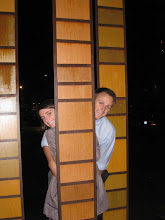This morning, I drove to Tacoma (a nice early morning trip) to attend the PRSA South Sound Group "Blogs as PR Tool" panel discussion. I thought it would be a nice networking event with fellow morning people, but it turned out to offer me additional insight to the world of blogging from a corporate standpoint.
The speaker panel included:
Lloyd Brown, Communications Director,
Washington State Department of TransportationEric Jones, Marketing Project Specialist,
Washington State Employees Credit UnionDerek Young, Founder & Editor,
Exit133.comMarcelene Edwards, Business Team Leader,
The News Tribune While each individual highlighted the pros/cons to utilizing a blog in their specific sphere, there were a few overarching messages that I thought might be helpful found applicable to any organization hoping to start a blog.
Here's what I learned:
1. Appeal to a specific audience. Although this may seem like a basic tenant to any communications strategy, it was most helpful to hear that prior to establishing a blog site it is not always necessary to do a great deal of research and analytics. Interestingly, when Lloyd Brown set up the DOT blog in 2006, it was the night of a major crisis and he wanted to respond immediately by establishing a blog. Sometimes it's just a matter of getting started and then evaluating your readers after they start coming and commenting.
2. Eric mentioned (and the panel agreed) that blogs offer 'real person' testimony. Having a YouTube video or even video account links on a sidebar can help reach visual learners with current content.
3. Tone of voice is critical to success. Being able to develop a single voice (as opposed to several different writers contributing to a blog) helps readers gain a level of attachment for the site and continue to visit. In an effort to keep the tone on your blog positive, stick to the facts. If you must quote individuals (which usually results in nasty disagreements in the comments section) link your article (or post) to a reputable news source.
4. Maintain consistency. Panelists agreed that once a week is necessary (but it doesn't help to exceed 4-5 a day). Similar to the argument for strong voice, consistency helps people develop attachment.
5. Promote your site by: 1. utilizing other blogs and 2. tagging your posts effectively. Go to the Web sites that are most applicable to your target audience and begin leaving educated comments that build credibility as a reputable resource. People will find your blog on Google through your tags, but a link to your site from something they're already reading is best. Sometimes it's as simple as tagging your signature block too.
Any other tips I missed?


 Time to glaze...
Time to glaze...







